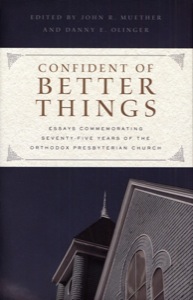Confident of Better Things
July 04, 2011

Essays Commemorating Seventy-Five Years of the Orthodox Presbyterian Church
The new book, Confident of Better Things, was recently released to commemorate the 75th anniversary of the Orthodox Presbyterian Church (OPC). Edited by Rev. Danny E. Olinger and Westminster alumnus John R. Muether (MAR '79), this book features Rev. Dr. Richard B. Gaffin, Jr., professor of bibilcal and systematic theology, emeritus; and Rev. Dr. Lane G. Tipton, associate professor of systematic theology; as well as numerous other Westminster alumni.
Visit the Westminster Bookstore for your copy!
Westminster Alumni featured in this book include:
- William D. Dennison (MDiv, '76; ThM '80)
- Richard B. Gaffin, Jr. (BDiv, '61; ThM, '62)
- Mark A. Garcia (MAR, '00)
- John R. Muether (MAR, '79)
- Robert B. Needham (MDiv, '66)
- Ronald E. Pearce (MDiv, '80)
- Gregory E. Reynolds (MDiv, '79)
|
- Jack W. Sawyer (MAR, '80; ThM '86)
- Roger W. Schmurr (MDiv, '70)
- Alan D. Strange (MDiv, '89)
- Robert B. Strimple (BDiv, '59; ThM, '65)
- Lane G. Tipton (PhD, '04)
- A. Craig Troxel (PhD, '98)
- Thomas E. Tyson (BDiv, '60)
|
 "Tongues Today?"
"Tongues Today?"
Excerpt of Dr. Gaffin's article
I take up the question posed in the title of this chapter with some uneasiness. My answer may leave the impression of running roughshod over experiences precious to other Christians (as I've learned from experience!). In view of the highly sensitive and personally charged dimension of this topic, I have found private conversation is often a more constructive way to address it. Yet for the good of the church some open discussion of it, as I undertake here, is in order. I do that with the hope that my treatment does not come across as insensitive to others or needlessly confrontational.
A Word about Christian Experience
Having raised the issue, I do wish to say a bit more about Christian experience. Tongues experiences claimed today are not themselves decisive for establishing their validity. They are not self-authenticating. Slogans like "500 million Pentecostals can't be wrong" or "theology divides; tongues unite" have a neat ring, but are not really very helpful, especially in a world religions scene where "tongues" experiences (what linguists call "free vocalization") are not unique among Christians.
We need to remember what for many may be obvious, but has a way of getting overlooked, at least practically: believers in Jesus Christ must assess all experiences, including those attributed to God's Spirir, by His word, His inscripturated word. Nothing about an experience itself may claim the final word, not even the results that may follow, however praiseworthy and beneficial in themselves—like an increased love for others, zeal for the gospel, and fervency in prayer. Only sound biblical doctrine, teaching faithful to Scripture, has the final say. Only as I have something to offer in that respect will my comments have value.
 "The Gospel and Redemptive-Historical Hermeneutics"
"The Gospel and Redemptive-Historical Hermeneutics"
Excerpt of Dr. Tipton's article
The gospel of Jesus Christ contains within itself a distinctive hermeneutic and theology of redemptive history. In the gospel we are confronted with a supernaturally communicated, progressively revealed, Sprit-given reality that has Christ, crucified and raised, as its center. The gospel generates its own distinctive conception of redemption in history, which, in turn, has a normative influence on biblical hermeneutics. A Christian hermeneutics therefore must be suited to its own distinctive subject matter regarding the redemptive revelation of the triune God.
Clarifying the relationship between biblical theology and hermeneutics, and the nature of the history presupposed in a proper understanding of a "grammatical-historical" reading of Scripture, will occupy the primary concerns of this essay. A biblical conception of redemptive history will demand not only that we understand the gospel as objectively presented in the Old Testament symbolism itself, but that typology is an inherent feature of Old Testament redemptive revelation. Accordingly, typology is a function of a grammatical-historical understanding of the Old Testament that grows out of its per se (or intrinsic) witness to Christ.
Visit the Westminster Bookstore for your copy!








 "Tongues Today?"
"Tongues Today?" "The Gospel and Redemptive-Historical Hermeneutics"
"The Gospel and Redemptive-Historical Hermeneutics"